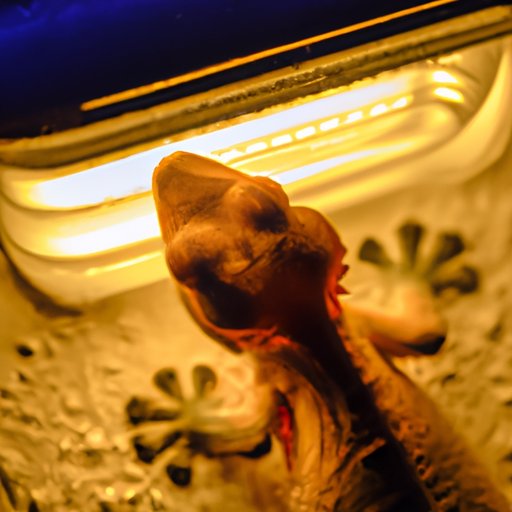Introduction
Crested geckos (also known as Rhacodactylus ciliates) are a species of lizards native to New Caledonia, a group of islands located in the South Pacific Ocean. As they are native to tropical and subtropical climates, it’s important to understand the environmental needs of these creatures when kept as pets. This article will explore whether or not crested geckos need a heat lamp and what kind of care is necessary to provide them with an ideal environment.

Exploring the Natural Habitat of Crested Geckos and Whether a Heat Lamp is Necessary
Before exploring the specific needs of crested geckos, let’s take a look at their natural environment. Their natural habitat consists of humid forests with temperatures ranging from 65-80°F (18-27°C). The daylight hours in these areas range from 10-12 hours. In terms of humidity, their natural habitat has a relative humidity of 60-75%.
Do Crested Geckos Need Heat Lamps? A Guide to Appropriate Care
Now that we have a better understanding of the natural habitat of crested geckos, let’s dive into the specifics of what kind of care is necessary for them.
Temperature Range
The optimal temperature range for crested geckos is between 70-80°F (21-27°C). It’s important to note that temperatures below 65°F (18°C) can be dangerous for them, as they may become stressed and prone to illness. Temperatures above 90°F (32°C) should also be avoided, as they can cause dehydration.
Lighting Requirements
In terms of lighting, crested geckos require 12 hours of daylight and 12 hours of darkness each day. This can be achieved through the use of a timer to control artificial lights, or by keeping them in an area with access to natural light. If using artificial lights, UVB lighting should be provided for 10-12 hours per day.
Humidity Levels
Crested geckos require a relative humidity level of 60-75%; lower levels can cause dehydration and health issues. Humidity levels can be maintained through misting and the use of a hygrometer.

How to Provide an Optimal Environment for Your Crested Gecko Without a Heat Lamp
It’s possible to provide an optimal environment for your crested gecko without the use of a heat lamp. Here are some tips on how to do so:
Increasing Ambient Temperature
One way to increase the ambient temperature in your crested gecko’s enclosure is to place it in a warm room, such as near a radiator or heating vent. You can also use ceramic heat emitters or under tank heaters to provide additional warmth.
Providing Adequate UVB Lighting
Crested geckos require UVB lighting for 10-12 hours per day, which can be provided through the use of fluorescent bulbs or LED lights. Make sure to position the lights correctly, as too much UVB can be harmful to your pet.
Creating and Maintaining Humidity
Humidity can be maintained through regular misting and the use of a hygrometer. You can also add live plants to the enclosure to help maintain the desired humidity levels.
What Temperature Range is Ideal for Crested Geckos?
As mentioned above, the optimal temperature range for crested geckos is 70-80°F (21-27°C). Temperatures outside of this range can cause stress and health problems. To ensure that your pet stays within this temperature range, there are several heating devices you can use, such as ceramic heat emitters, under tank heaters, and heat mats.
Do Crested Geckos Need Heat Lamps or Can They Thrive with Natural Light?
Crested geckos can thrive with either natural or artificial light. Natural light is preferred, as it provides both UVA and UVB rays, which are essential for your pet’s health. However, if natural light is not available, you can provide artificial lighting with fluorescent bulbs or LED lights.
How to Keep Your Crested Gecko Warm Without a Heat Lamp
If you choose to not use a heat lamp, there are other ways to keep your crested gecko warm. These include:
Substrate
Using a substrate that retains heat, such as coconut coir or cypress mulch, can help to keep your pet warm. Just make sure to avoid substrates that are dusty or retain too much moisture.
Heat Mats
Heat mats can be placed underneath the enclosure to provide additional warmth. Just make sure to follow the manufacturer’s instructions to ensure proper use.
Heat Rocks
Heat rocks are another option for providing additional warmth. However, these should be used with caution, as they can get very hot and can cause burns if touched.

The Benefits and Drawbacks of Using a Heat Lamp for Crested Geckos
Using a heat lamp for crested geckos can be beneficial, but there are also drawbacks to consider. Here are some of the pros and cons of using a heat lamp for your pet:
Pros of Using a Heat Lamp
A heat lamp can provide an easy way to regulate the temperature in your pet’s enclosure. It can also provide additional light, which can be beneficial for your pet’s health.
Cons of Using a Heat Lamp
Heat lamps can be expensive and can create too much heat, which can be dangerous for your pet. Additionally, they can be difficult to regulate and can create excess humidity, which can be harmful to your pet.
Conclusion
To summarize, crested geckos require a specific range of temperatures, lighting, and humidity levels in order to thrive. While a heat lamp can be beneficial, it’s not always necessary. There are other ways to provide an optimal environment for your pet, such as increasing ambient temperature, providing adequate UVB lighting, and creating and maintaining humidity. Ultimately, it’s up to you to decide what is best for your pet and its environment.
Final Thoughts
Caring for a crested gecko can be a rewarding experience, but it’s important to understand their needs and provide an appropriate environment. By doing research and staying informed, you can ensure that your pet stays healthy and happy.


